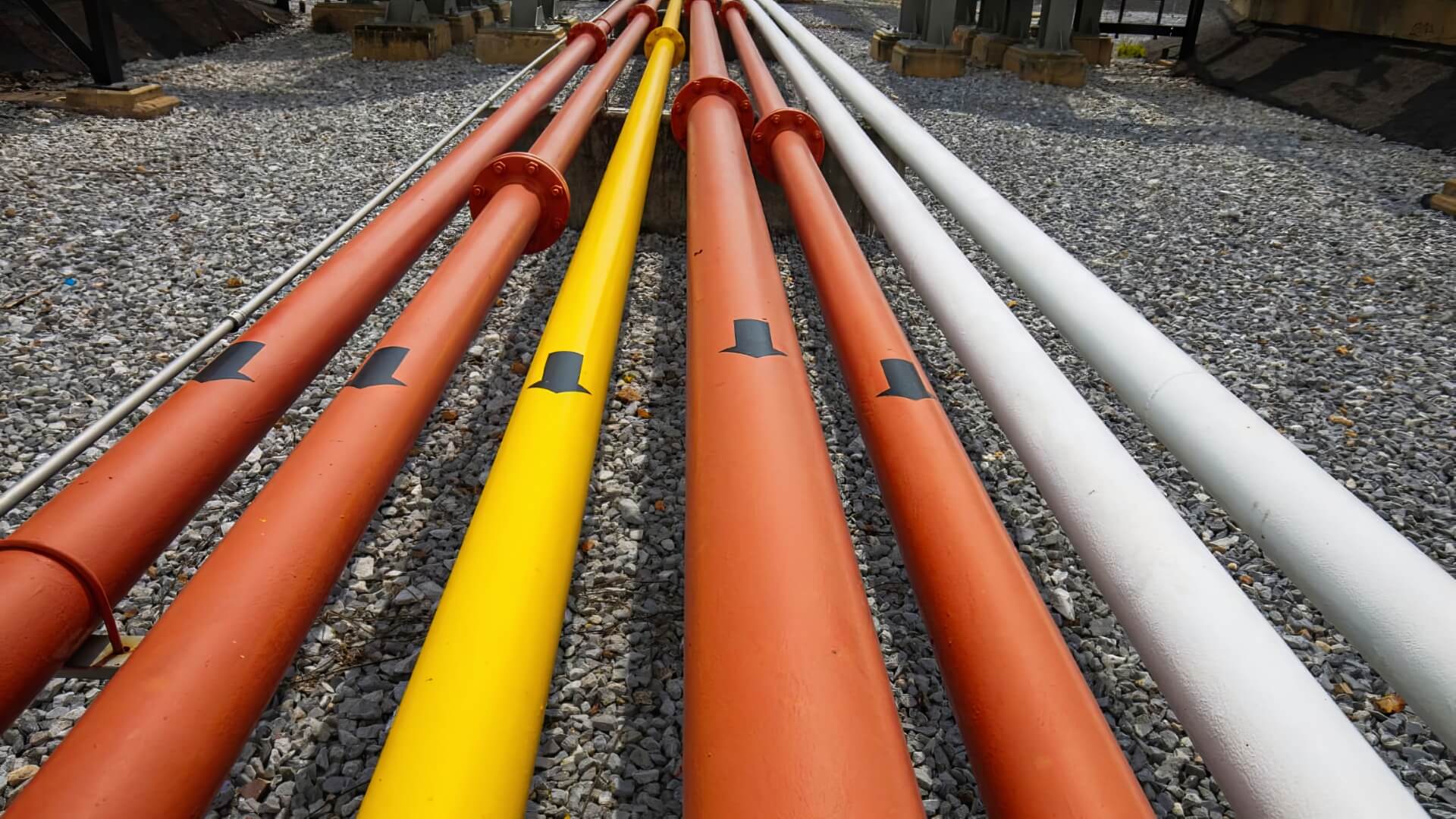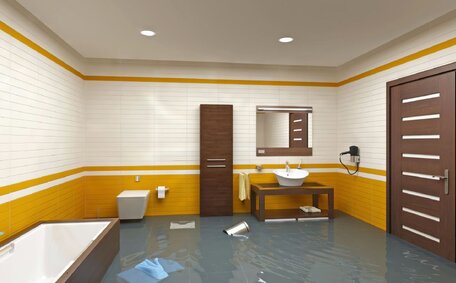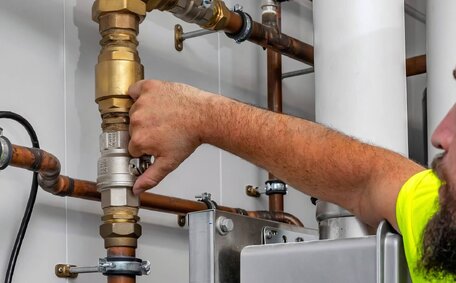Introduction to Hot Water Systems
Water heaters are crucial for home comfort and business operations, providing essential hot water for daily activities. Water heaters can supply hot water continuously from your hot water heater for various daily needs like washing, cleaning, and bathing.
There are several most common types of hot water heaters:
- Electric water heaters have insulated tanks for heating and storing water.
- Tankless gas water heaters heat water directly with gas burners, eliminating the need for a storage tank.
- Instantaneous electric systems provide hot water on-demand, without requiring a storage tank.
- Tankless gas continuous flow systems heat water instantly as it flows past the burners.
- Solar water heaters utilise solar panels and storage tanks to capture and store heat.
- Heat pump units employ a heat exchanger to draw in ambient heat for warming water.
Moorebank Plumbing in Sydney specialises in servicing residential and commercial hot water systems, ensuring professional care when needed. This article will delve into how to fix some common issues experienced with hot water systems and guide you on troubleshooting them.
Common Signs of Hot Water System Issues
There are several tell-tale signs your hot water system may have underlying issues that require troubleshooting:
Inconsistent Water Temperature
Fluctuating water temperatures may indicate a problem with your heater, affecting showers and taps. Reasons for your hot cold water temperature being too hot or not sufficiently heated, reflecting a common fluctuation issue, can include:
- Faulty thermostats in an electric hot water heater failing to regulate heat properly.
- A broken heating element unable to warm water sufficiently.
- Sediment build-up inside your tank insulating heating elements.
- Continuous use over time can result in wear and tear of internal components.
Inconsistent output temperatures typically indicate a need to get your system inspected and repaired.
Strange Noises
Beware of unusual rumbling, banging, or loud humming from your heater – if your system takes too long to quieten, these noises are not normal. Potential causes of strange noises from your water heater’s components include:
- Low water pressure straining pipes and fittings.
- Scale accumulation rattling loose inside the storage tank.
- Failing heating elements, which could also involve faulty thermostats or sensors.
- Cracks or breaches in the water tank body from which water can leak may be caused by multiple factors.
Promptly address strange noises by having a technician inspect your heater.
Discoloured Water
Any discoloured water or sediment at your family’s taps usually indicates hot water problems, such as corroding metal components inside the tank. Other causes of discoloured water include:
- Failing sacrificial anode rod.
- Internal biofilm and bacteria accumulation.
- Incoming Hot and cold water supply corrosion problems.
Cloudy or discoloured water is a sign you should service your system and replace any worn parts.
No Hot Water Output
Few things are as frustrating as a complete lack of hot water from your system. When you turn your hot taps on and detect no heated water, it could be highlighting an issue suggestive of a system breakdown.
Being without water at the right temperature can severely impact households and businesses, raising concerns about keeping your water system working efficiently. Typical daily activities like taking a hot shower, washing hands, doing laundry and washing dishes become difficult or impossible.
An early troubleshooting step for gas systems with no hot water is to check the pilot light. If the flame is not blue but instead yellow or orange, it indicates improper gas combustion. This can prevent heating elements from igniting to heat up water in electric storage units.
You may restore hot water by relighting the pilot light.
Further steps when no hot water output is detected include:
- Ensuring the strainer valve isn’t blocked while checking for consistent water levels and power supply to electric systems, as well as steady gas supply to gas types.
- Testing heating elements, thermostats, the flow sensor, tempering valve, and other crucial components for faults.
- Assessing if the pressure relief valve has opened due to excess pressure build up.
- Inspecting for leaks throughout pipes and fittings.
- Examining if the anode rod is corroded and might need replace.
- Cleaning inlet water strainers blocked by debris.
- Considering heat pump unit refrigerant charge and airflow issues.
- Checking the age and warranty status of existing system to determine repairs vs replacement.
If basic troubleshooting does not reveal the reason for loss of hot water, call your local licenced plumber to thoroughly inspect your system.
Causes of No Hot Water
Some causes of complete water problem scenarios, like the loss of hot water output, include:
Tripped Circuit Breaker
For electric storage tank or instantaneous systems, a circuit breaker that trips and shuts down can cut the power supply and prevent heating elements from switching on. Circuit breakers may trip due to power spikes, making it essential to get your system checked for overloaded circuits or electrical shorts.
Extinguished Pilot Light
Gas systems, crucial for heating gas water efficiently, rely on a pilot light to ignite the main burner. If this small flame goes out, which can happen with water heaters, it must be manually re-lit to restore hot water flow. Windy conditions or drafts can cause pilot lights to blow out.
Faulty Gas Valve
A damaged gas valve can restrict flow to the burner, preventing proper ignition and heating. This starves the flame of fuel so it cannot heat water. Getting a gas fitter to repair or replace the valve is needed.
Lack of Maintenance
Ignoring regular servicing can lead to inefficiency and potentially dangerous gas leaks in valves. Annual inspections and maintenance can supply hot fixes to problems and improve lifespan. Catching minor issues early prevents major breakdowns.
Fixes for No Hot Water
If you have no hot water flowing from taps, apply these troubleshooting steps to diagnose the problem before calling a plumber:
Check Power Supply
Ensure your circuit breaker or fuse is keeping your hot water working by supplying power to your electric hot water system. Make sure your circuit breaker reset if required.
Relight Pilot Light
Carefully relight the pilot light on your gas hot water systems and other appliances your home may have according to the manufacturer’s guidelines if it has extinguished. Always exercise caution when handling other gas appliances and gas-related challenges.
Inspect Heating Elements
If you suspect a problem your heating elements, visually check them inside electric storage tank systems for burnout or damage. Have a licenced electrician replace faulty elements.
Assess Water Pressure
A less than optimal water flow rate can prevent supply water from exiting the hot water tap efficiently. Check inlet water strainers for blockages reducing flow.
Should basic troubleshooting not resolve the issue, contact a qualified plumber who can fix your system after a thorough inspection.
Hot Water System Leaks
System leaks pose a considerable challenge, particularly when water seeps into your premises. Studies indicate that over 30% of leaks are due to excess water pressure compromising your taps. Other factors also contribute to leaks which can range from minor drips to catastrophic pipe bursts flooding a building.
Common Leak Locations
Typical areas where leaks occur with your water systems include:
- Pipe joints - Corrosion and loose fittings allow water to escape connections.
- Storage tanks - Internal corrosion and erosion create small holes that weep water.
- Check your hot water heaters - Failures around heating elements and fittings can lead to leaks.
- Pipes - Age, acidic water and pressure take their toll weakening pipes.
Catching leaks early in your plumbing system and applying repairs can help you figure out how to prevent the problem from worsening over time. Annual servicing checks to find out about emerging leak points. Understanding causes assists troubleshooting.
Causes of Hot Water System Leaks
Reasons why hot water systems spring leaks include:
- Excess water pressure - Strains components allowing water to escape seals.
- Internal corrosion - Erodes tanks and pipes until they leak.
- Freezing weather - Ice expansion in pipes causes cracks and splits.
- Old age - Wear and tear ultimately causes failures and leakage.
- Sediment - Accelerates erosion of internal surfaces once water penetrates.
It’s important to know how to swiftly identify the root cause of any leak in your heating system aids the repair process. Understanding why leakage occurred also prevents repeat issues.
Causes of Leaks
There are several common causes behind leaks occurring in hot water systems:
Corrosion
Internal corrosion caused by acidic water eating away at metal components is a major contributor to leaks. Tanks, pipes, valves and fittings corrode from the inside over many years before failures occur.
Excess Water Pressure
Continually high water pressure that can damage seals, gaskets, and connections, is one of the contributors to water heater issues. Eventually this pressure forces water through cracks and worn areas resulting in drips or bursts.
Freezing Weather
If freezing temperatures affect water then it can expand inside pipes, causing cracks and splits that leak once thawed. Areas prone to freezing weather require insulation and heat trace wiring to protect hot water pipes.
Old Age & Wear
As components like storage tanks and internal parts age over 5-15 years, erosion and general wear ultimately cause failures. When seals, valves and pipes degrade enough, leaks inevitably occur.
Fixing Leaks
Addressing the amount of water leaked by your hot water system requires cautious handling. Minor drips may be manageable through tightening fittings or replacing worn washers. However substantial leaks or ones emitting from gas appliances call for professional assistance.
Handling Minor Leaks
For small water leaks in your hot water unit, the first step is attempting to tighten any loosening pipe connectors or joints using an adjustable wrench.
Ensure the water supply is off to prevent issues and keep your hot water working efficiently. Persistent leaks might need a check of washers inside threaded fittings as outlined in the system’s documentation. Replace any worn or cracked washers to stop leakage.
Professional Repairs Needed
Larger hot water system leaks or ones originating from gas lines or appliances require a licenced plumber’s expertise. The risks from electric shocks, floods, fires or gas leaks means you should not attempt DIY repairs. Our team at Moorebank Plumbing deal with hot water system leaks promptly and safely.
When your system shows signs of leakage, don’t delay in contacting our friendly staff to address these concerns. Catching issues early prevents extensive damage down the track. Call us on 1300 349 338 or email to book an appointment.
Temperature Fluctuations
Inconsistent or fluctuating hot water temperatures are a nuisance and can also pose safety hazards. Thermostats play a vital role in regulating heat within hot water systems to deliver water at stable temperatures.
Your thermostat being faulty is often the perpetrator of temperature fluctuations. Electric storage systems in particular rely on properly calibrated thermostats to govern heating elements. Thermostats should generally hold temperatures, ensuring they’re not set too cool or excessively hot, between 50-60°C.
It’s advisable to periodically check the water your hot water system’s thermostat in small increments if the temperature feels incorrect. Have a licenced plumber inspect it if problems persist. Failing thermostats need replacement to restore stability.
Maintaining Your Hot Water System
Regular maintenance ensures you have enough hot water and helps to address and fix problem occurrences in any hot water system, thereby maximising its lifespan and minimising issues. We recommend an annual service by a qualified technician to check all components and flush the tank. They will assess critical parts like heating elements, anodes, valves and seals for wear and corrosion.
Basic DIY maintenance steps you can take include monitoring water temperature and pressure gauges monthly for fluctuations, listening for unusual noises, and visually checking pipes and tanks for leaks. Keep the system free of debris, ensure adequate ventilation and gas flow if applicable, and test pressure relief and tempering valves.
Modern water unit warranties often condition that the unit isn’t working properly, requiring proof of periodic servicing. Well maintained units generally last 8-15 years. Replacing sacrificial anode rods every 5 years also reduces internal corrosion prolonging tank life.
When to Call a Professional
There are certain hot water system problems that require a professional plumber to safely handle. Issues involving gas appliances, electricity, floods and major leaks pose serious risks if you attempt DIY repairs.
Call Us For:
- Suspected gas leaks - Immediate attention is vital, never ignore the smell of gas. Ventilate the area and call our 24/7 emergency number.
- No hot water output - If basic troubleshooting fails to get your hot water flowing again, expert diagnosis is needed.
- Major leaks or pipe bursts - Turn off water supply immediately, but if an inspection does instant remedy needed, call a professional to prevent property damage.
- Strange noises from the system - Unusual sounds indicate loose, failing components that need inspection.
- Multiple issues occurring - Complex problems are best assessed by a licenced technician.
Don’t take risks trying to fix complicated or dangerous heater problems yourself. Our team at Moorebank Plumbing have the expertise to troubleshoot faults and safely complete repairs. Call us on 1300 349 338 or email for assistance.
Summary
The appliances in your home, like your hot water systems, are vital and can require attention if issues develop over time. This article explored common problems like loss of hot water, leaks, temperature fluctuations and strange noises. Understanding causes assists in troubleshooting early signs that common hot water issues are amiss before significant failures occur.
Discovering more about regular maintenance remains crucial for maximising a system’s lifespan and minimising breakdowns. Annual servicing alongside monitoring home pressure and heat levels is wise. However, some most substantial leaks or complex faults do require a licenced plumber’s expertise.
Safety should be the priority when assessing hot water system issues. Attempting risky DIY repairs on gas or electric systems can have severe consequences. Our team at Moorebank Plumbing have the experience to diagnose and resolve faults promptly and securely.
Don’t hesitate contacting us on 1300 349 338 for assistance maintaining or repairing your hot water system. Catching problems early prevents extensive damage occurring down the track.






